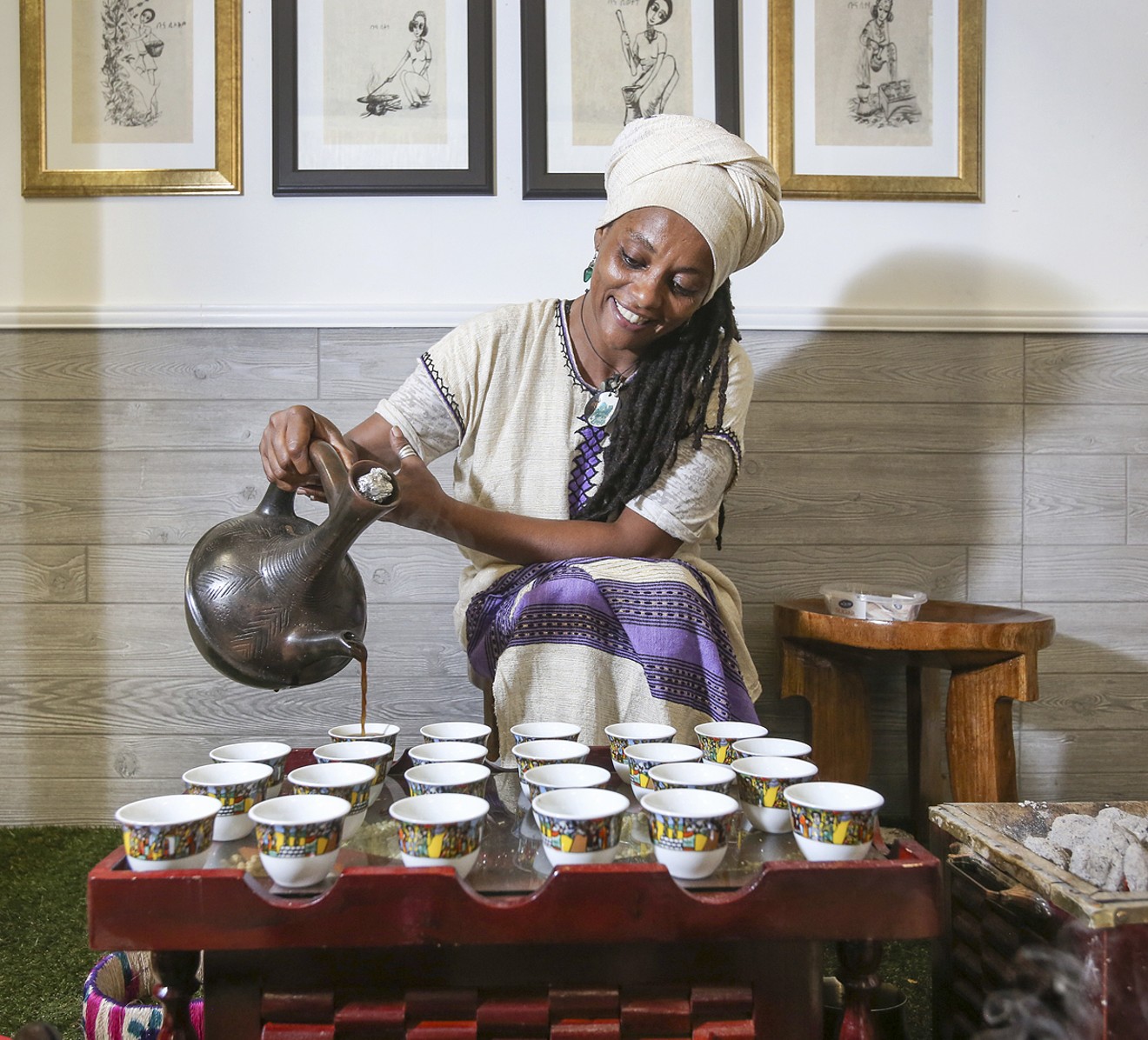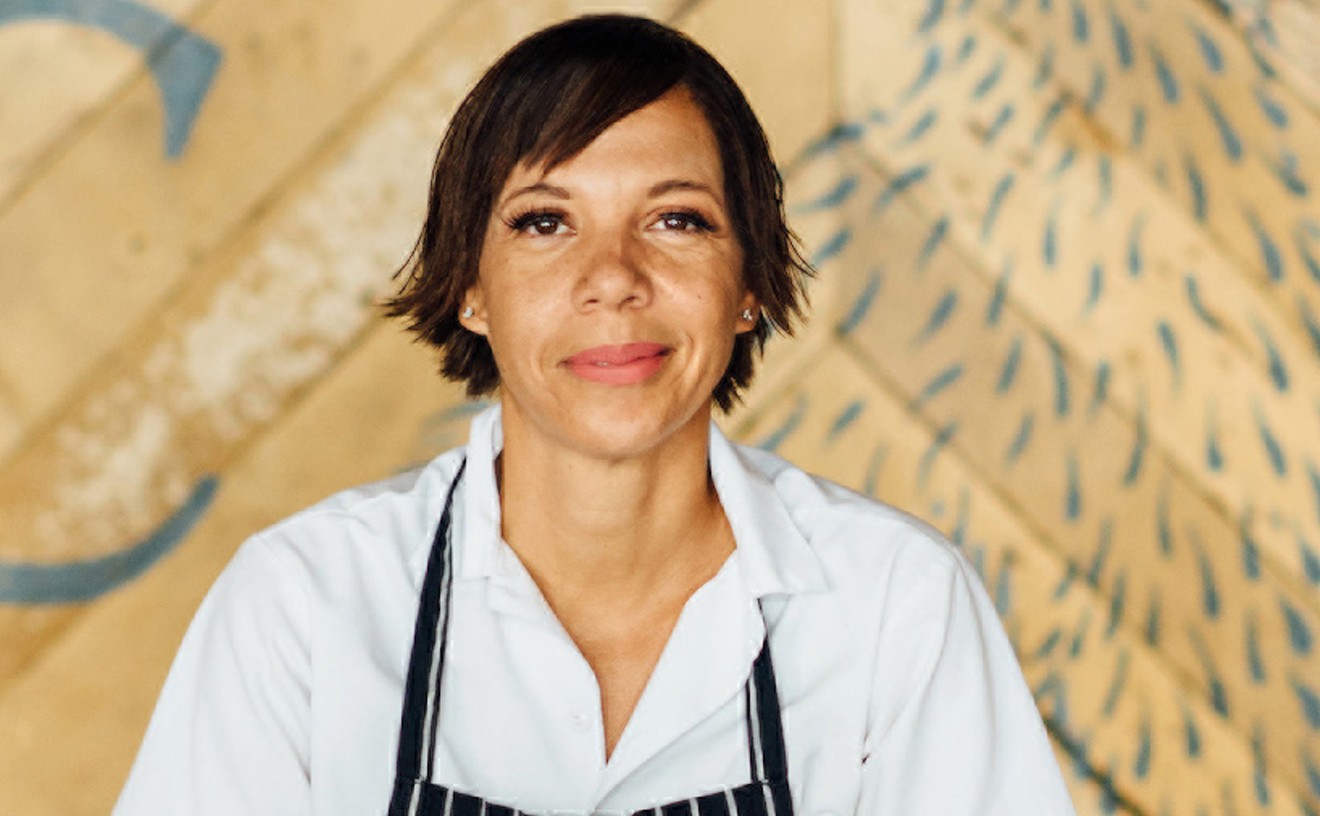There are many ways to eat raw beef, but Ethiopians do it best. At Awash Ethiopian Restaurant (19934 NW Second Ave., Miami Gardens; 305-770-5100; awashmiami.com), the national treasure called kitfo ($12.99) arrives on a gleaming metal platter heaped with finely diced raw beef and seasoned with clarified butter perfumed with garlic, onion, and perhaps fenugreek, nutmeg, and ginger. Alongside it sit rolls of the spongy, stretchy flatbread called injera, a small dish of a fiery-red powder known as mitmita, and a knob of house-made cheese.
Using your hands to share a meal brings you closer to your dining companion.
tweet this
To eat it, you tear off a piece of injera and pick off a hunk of the ground meat about the size of a walnut. Then grab a bit of cheese, preferably the verdant one flavored with collard greens and garlic. Finally, dab it all in the mitmita, and pop it in your mouth. Repeat until satisfied.
There's something ceremonial about eating this way. Using your hands to share a meal from a single platter brings you closer to your dining companions and the food itself. That's just what Awash's owners, husband and wife Fouad and Eka Wassel, planned.

This airy space is decorated with traditional Ethiopian accents, such as stunning portraits of Ethiopians in traditional garb and a spindly pillar with protruding supports used to hold up village huts. Awash opened in early September, making it one of the very few places in South Florida where one can procure cuisine from the Horn of Africa.
But Awash is more than just a restaurant. Much of the dining room is filled with low-slung tables called mesobes that are covered with brightly colored woven cones surrounded by squat leather-topped chairs. Off on the far side of the room, under a thatched lean-to, sits a small charcoal stove near a table covered with coffee cups. The setup is used for a coffee ceremony that in Ethiopia is a joyous gathering sometimes performed thrice daily.
Fouad, who is 51 years old with dark-brown skin, a sharp jaw, and a narrow frame, arrived in South Florida in 1986 to study business at what was then called Fort Lauderdale College. Born in the capital, Addis Ababa, to a well-to-do family that owned a massive bakery, he earned pocket money as a teen by trekking to small villages and bringing back chicken and eggs to sell in the city. But by the late '70s, as communism began to take hold, he and his family's good fortune began to change. In 1984, his father, along with more than three dozen of the city's high-profile merchants, was arrested and thrown in jail.
"The accusation was that he was taking money out of the country," Fouad explains. "They tortured him and kept him in the dark for weeks at a time. It was six months before we could see him."
His father was eventually released, but upon receiving his freedom, he began sending his children abroad to escape a country they would later learn was descending into chaos. In Florida, Fouad earned a business degree and opened a handful of convenience stores as well as import-export companies that ship goods between the United States and East Africa.
He caught his first glimpse of his wife Eka when his brother showed him a video of a cousin's wedding from back home. In 1996, he hopped on a plane bound for Addis Ababa to court her. A year later, they were married, and in 1998, the first of their four children was born.

Eka, meanwhile, had just begun nurturing a passion for cooking that would one day lead her to run the kitchen at this now-bustling spot. Though her mother cooked well, Eka says, a neighbor by the name of Etey Ababu taught her the foundations of Ethiopian food. There were lessons in how to make injera — the airy sourdough flatbread made with the flour of the iron-rich grain called teff, which is ubiquitous in Ethiopia. Here, however, Eka admits she doesn't make it.
"It's not an easy thing to do," she says. "When we got serious about the restaurant, I tried making it at home. When I realized it wasn't right, we brought in a friend, an old lady, who makes it perfectly for us every day."
But Eka perfectly makes the seasoned, clarified butter that graces many of Awash's dishes and is known as niter kibbeh. It's one of those things that can be found in almost every home and restaurant across Ethiopia but whose iterations are never quite the same. Eka balks when asked about the ingredients, responding only with a quick shake of her head.
That's just fine, because the fatty seasoning lends a stunning depth and richness to much of Awash's menu. The best move upon taking a seat is to order one of the combination platters, either vegetarian ($13.99 for one, $19.99 for two) or one with everything ($19.99 for one, $24.99 for two) for a taste of it all, set out in small heaps on a manhole-cover-size carpet of injera.
At the center is the stewed chicken dish, doro wot ($12.99). To prepare it, start by stewing onions until they're bronzed and nearly melted. Then come heaps of the spice mix berbere, which often includes chili powder, allspice, nutmeg, paprika, coriander, cinnamon, and cardamom. The resulting flavor has the complexity and gentle sweetness of Mexico's mole. No wonder this was a dish reserved for special occasions. When Eka was growing up, she says, it was most often brought out on holidays and once or twice a week when the family would slaughter a lamb. The beef dish called zilzil wot ($12.99) takes a similar approach, though the stew is spiked with ginger and is braised, resulting in meat that easily falls apart between your fingers.
Yet along with the kitfo, the vegetarian dishes can be most alluring. Despite a famine that killed untold millions, the country boasts many lush, widely varied ecosystems that include some of the continent's most fertile land.
Cabbage, carrots, onions, garlic, and ginger are gently coaxed into a tender salad-cum-stew called tikel gomen ($9.99) that makes for a bright, grassy break from the heavier meat dishes. Lentils and other legumes are employed much in the way they are on the Indian subcontinent. Perhaps India's love for daal began with African ancestors. Split yellow lentils are combined with turmeric and spicy green peppers to create the velvety kik alicha yetsom ($9.99). For the dish called misir wot ($9.99), red lentils are cooked into a thicker, more fragrant stew in which the legumes are a bit more al dente.
In another preparation, Eka cooks split peas, chills them, and then tosses them with onions and chili to make an enticing cold salad. On a recent day, she had beets on hands that were roasted, peeled, and then prepared in a similar fashion, yielding an incredible earthiness that melded perfectly with injera and her rich, house-made cheese, ayeb.
Though all of this might surprise you, Fouad points out it shouldn't. The Awash River, for which this restaurant and many other Ethiopian eateries around the country are named, is a UNESCO World Heritage Site that is a cradle of humanity. The valley surrounding it was where researchers in 1974 found 52 fossilized bone fragments of the famed early hominid known as Lucy. Carbon dating put the partial skeleton's age at more than 3 million years.
It's a fact almost every Ethiopian knows. But it's also one that illustrates the history of this part of the world and that much of human culture was born here. Too many people imagine only famine and war when they think of Ethiopia, but the Wassels are changing that misconception one bit of injera at a time.













